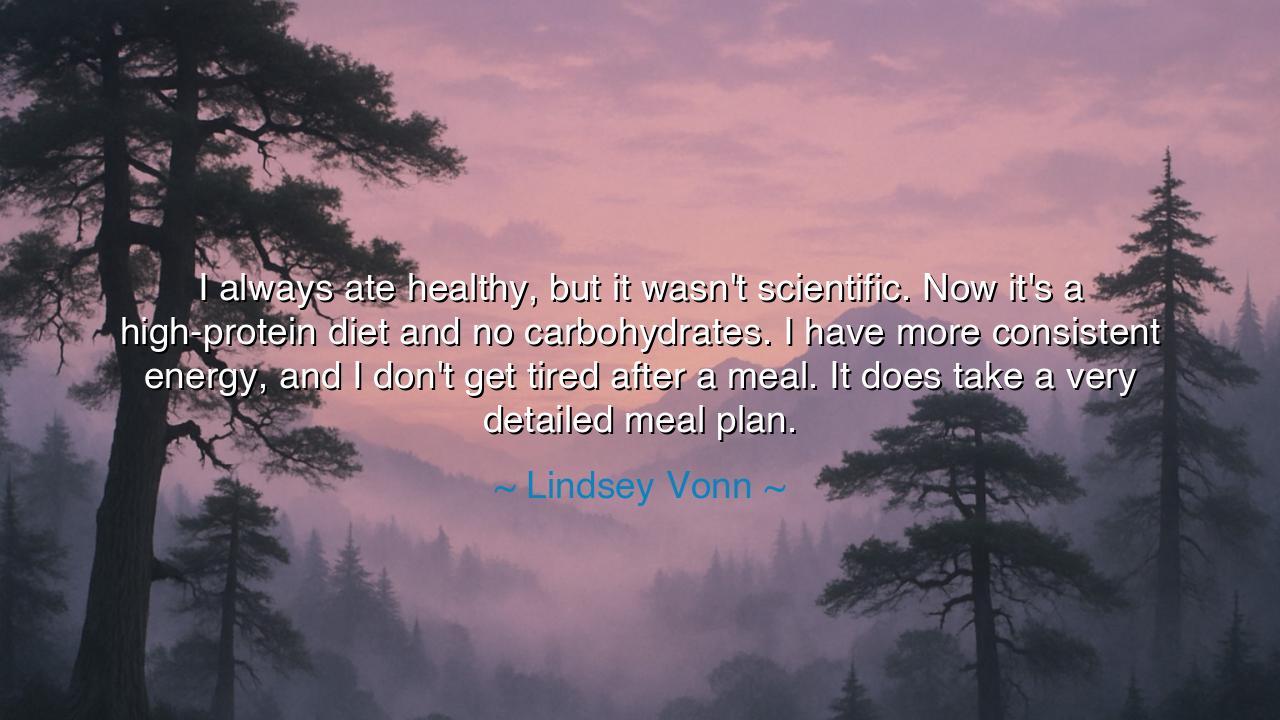
I always ate healthy, but it wasn't scientific. Now it's a
I always ate healthy, but it wasn't scientific. Now it's a high-protein diet and no carbohydrates. I have more consistent energy, and I don't get tired after a meal. It does take a very detailed meal plan.






The words of Lindsey Vonn, “I always ate healthy, but it wasn’t scientific. Now it’s a high-protein diet and no carbohydrates. I have more consistent energy, and I don’t get tired after a meal. It does take a very detailed meal plan,” echo with the ancient wisdom of discipline, self-mastery, and the eternal pursuit of balance. Though spoken by a modern athlete, her reflection resonates like the teachings of the old philosophers who believed that the body is the temple of the spirit — and that only through mindful care and structure can one unlock the fullness of strength and purpose. Beneath her words lies a truth both humble and heroic: that true vitality is not given, but earned through patience, awareness, and the art of order.
In her journey from instinct to intention, Vonn reveals a transformation that mirrors the ancient evolution from chaos to cosmos — from natural impulse to disciplined design. She confesses that she had “always eaten healthy,” but that her methods lacked science, meaning her choices, though good, were without precision. This shift toward a high-protein, low-carbohydrate diet, guided by knowledge and structure, is symbolic of the journey every seeker undertakes: to move from the vague to the deliberate, from the feeling of goodness to the understanding of truth. In her meals, as in her training, Vonn becomes not just a body in motion, but a mind at work — a spirit aligned with purpose.
The ancients knew this union well. The Greek philosopher Pythagoras taught that harmony in the body mirrors harmony in the soul, and that order in one’s habits is the first step toward enlightenment. Likewise, the warriors of Sparta lived by strict dietary codes, for they understood that food was not merely fuel, but the foundation of endurance and discipline. Their meals were simple yet purposeful, designed not to indulge the senses but to strengthen the will. So too does Vonn’s “very detailed meal plan” embody this sacred order — a reminder that the path to mastery demands not indulgence, but intention.
When she speaks of “consistent energy” and of no longer feeling tired after a meal, she is describing more than a physical state; she is describing clarity — the serene strength that arises when one lives in alignment with purpose. It is the same balance that the yogis of India sought through mindful eating and breath, the same equilibrium the Stoics pursued through moderation. The energy she describes is not the fleeting rush of appetite’s satisfaction, but the steady flame of harmony — the light that burns only when the body, mind, and will are in accord. Her diet becomes an act of mindfulness, a meditation in motion, proof that discipline is the mother of freedom.
Consider the story of the Roman general Cato the Elder, who lived in an age of luxury yet chose austerity. He ate simply — coarse bread, water, and olives — not from poverty, but from principle. He believed that indulgence weakens the mind and that the disciplined body becomes the servant of reason. Though his ways were mocked by his peers, Cato lived long, strong, and unshaken, his will unbent even in the face of Rome’s decadence. In the same spirit, Vonn’s approach to diet is not about deprivation, but about dominion — about claiming mastery over her impulses so that her strength may serve her higher goals.
The lesson her words impart is not limited to athletes or the body alone. It speaks to all who seek excellence in their craft, for the laws that govern the flesh also govern the mind. To live with power, one must live with plan. To sustain energy — of body, of thought, of heart — one must cultivate structure. The “detailed meal plan” of which Vonn speaks may, in truth, be a metaphor for all of life: that greatness does not arise from impulse, but from design; not from indulgence, but from focus.
Let this, then, be the teaching: live deliberately. Know what you consume — not only in food, but in thought, in emotion, in habit. Be scientific in your choices, not in the coldness of calculation, but in the warmth of understanding. Feed your body as you would feed your purpose — with care, precision, and gratitude. When you eat, do so not for pleasure alone, but for power; not for comfort, but for clarity.
For as Lindsey Vonn reminds us, vitality is not a gift of chance, but a discipline of will. To plan your nourishment is to plan your strength; to master your diet is to master yourself. When one lives with awareness — in food, in thought, in spirit — the fatigue of life begins to fade, and a deeper energy takes its place. It is the energy of harmony, the endurance of purpose, the quiet flame that lights the way for all who choose to live with intention and grace.






AAdministratorAdministrator
Welcome, honored guests. Please leave a comment, we will respond soon